亳州导游词英文版
- 格式:docx
- 大小:21.52 KB
- 文档页数:12
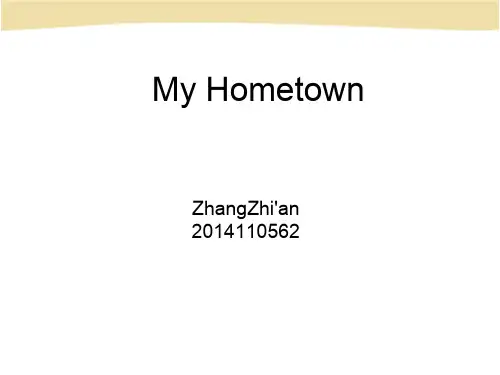
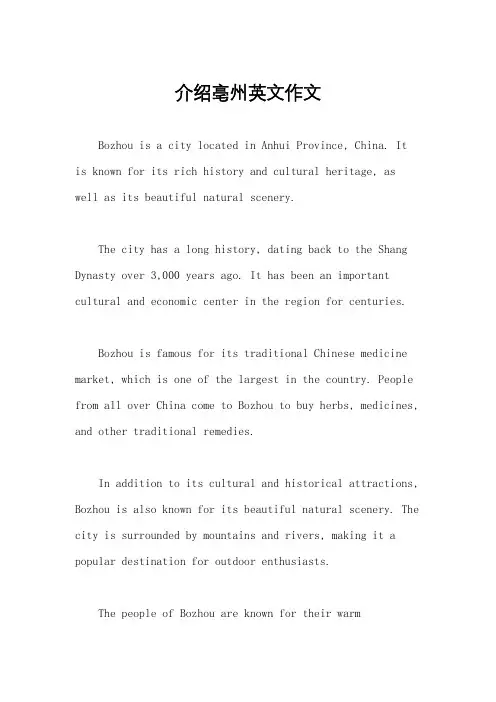
介绍亳州英文作文Bozhou is a city located in Anhui Province, China. It is known for its rich history and cultural heritage, as well as its beautiful natural scenery.The city has a long history, dating back to the Shang Dynasty over 3,000 years ago. It has been an important cultural and economic center in the region for centuries.Bozhou is famous for its traditional Chinese medicine market, which is one of the largest in the country. People from all over China come to Bozhou to buy herbs, medicines, and other traditional remedies.In addition to its cultural and historical attractions, Bozhou is also known for its beautiful natural scenery. The city is surrounded by mountains and rivers, making it a popular destination for outdoor enthusiasts.The people of Bozhou are known for their warmhospitality and friendly nature. Visitors to the city are often impressed by the kindness and generosity of the local residents.Overall, Bozhou is a city with a rich history, vibrant culture, and stunning natural beauty. It is a place that offers something for everyone, whether you are interestedin history, culture, or outdoor activities.。
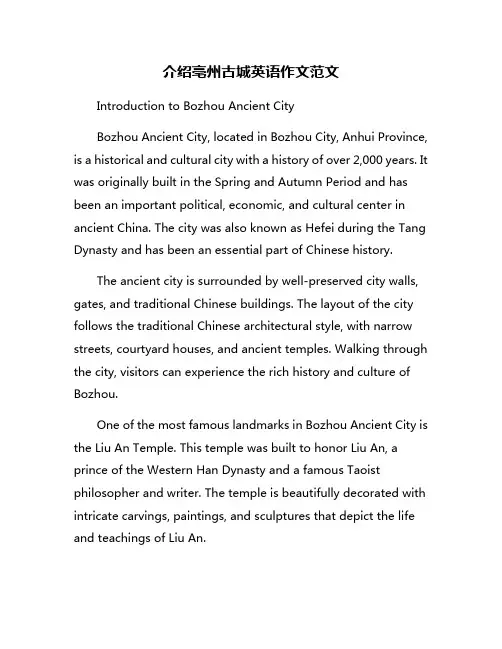
介绍亳州古城英语作文范文Introduction to Bozhou Ancient CityBozhou Ancient City, located in Bozhou City, Anhui Province, is a historical and cultural city with a history of over 2,000 years. It was originally built in the Spring and Autumn Period and has been an important political, economic, and cultural center in ancient China. The city was also known as Hefei during the Tang Dynasty and has been an essential part of Chinese history.The ancient city is surrounded by well-preserved city walls, gates, and traditional Chinese buildings. The layout of the city follows the traditional Chinese architectural style, with narrow streets, courtyard houses, and ancient temples. Walking through the city, visitors can experience the rich history and culture of Bozhou.One of the most famous landmarks in Bozhou Ancient City is the Liu An Temple. This temple was built to honor Liu An, a prince of the Western Han Dynasty and a famous Taoist philosopher and writer. The temple is beautifully decorated with intricate carvings, paintings, and sculptures that depict the life and teachings of Liu An.Another must-see attraction in Bozhou Ancient City is the Anhui Museum. This museum houses a vast collection of artifacts, relics, and historical documents that showcase the history and culture of the region. Visitors can learn about the ancient emperors, scholars, and artists who once lived in Bozhou and explore the various aspects of their lives.In addition to its historical and cultural attractions, Bozhou Ancient City also offers a vibrant food scene. Local restaurants serve traditional Anhui cuisine, which is known for its bold flavors and unique cooking techniques. Visitors can try dishes such as braised pork belly, boiled fish with pickled vegetables, and stewed tofu with mushrooms.Overall, Bozhou Ancient City is a fascinating destination for history buffs, culture enthusiasts, and food lovers alike. Its rich history, well-preserved architecture, and delicious cuisine make it a must-visit destination in China. Whether you are interested in ancient Chinese history or simply want to experience the charm of a traditional Chinese city, Bozhou Ancient City has something for everyone.。

介绍家乡亳州的英语作文1.My Hometown, BozhouMy hometown, Bozhou, is a charming city in Anhui Province. It's renowned for its rich herbal culture and historical heritage. Walking through the ancient streets, one can feel the pulse of history. The scenic natural landscapes add to its allure. Delicious local food and friendly people make it a warm and inviting place. Bozhou, a gem of China, holds a special place in my heart.2.The Cultural Vibrancy of My Hometown, BozhouNestled in the heart of Anhui Province, my hometown of Bozhou is a cultural haven, rich in history and tradition.Bozhou is renowned for its profound herbal culture, a legacy that dates back centuries. The city is a hub for traditional Chinese medicine, boasting herb gardens and pharmacies that preserve ancient healing practices.Moreover, Bozhou's ancient architecture and temples exude a timeless charm. Walking through its narrow lanes, one can encounter traditional buildings and religious shrines, each a testament to the city's historical roots.The local arts and crafts are also a highlight, reflecting the creativity and skill of Bozhou's artisans. From intricate embroidery to hand-painted pottery, these works of art are a beautiful representation of the city's cultural heritage.Festivals and customs further enrich Bozhou's cultural landscape, bringing the community together in celebration.In summary, Bozhou is a cultural gem, exuding a unique charm that combines ancient traditions with modern vitality.3.My Hometown, Bozhou: A Mosaic of Cultural SplendorNestled within the verdant landscapes of Anhui, Bozhou stands as a cultural beacon, its tapestry of traditions and heritage weaving a narrative of time-honored splendor. Boasting a rich herbal legacy, Bozhou is a sanctuary for traditional Chinese medicine, its gardens and pharmacies guarding ancient healing secrets. Its ancient architecture, with intricate carvings and soaring temples, whispers tales of a bygone era.The city's artisans exhibit profound craftsmanship, their embroidery and pottery a testament to Bozhou's artisanal excellence. Festivals and customs pulse with the rhythm of the seasons, uniting the community in a celebration of cultural identity.In Bozhou, the past and present coexist harmoniously, creating a mosaic of cultural splendor that is truly captivating.4.The Cultural Charms of My Hometown, BozhouMy hometown, Bozhou, is a cultural gem in the heart of Anhui Province. Deeply rooted in history, it boasts a rich tapestry of cultural traditions and heritage. Firstly, Bozhou is renowned for its profound herbal culture. As the birthplace of traditional Chinese medicine, it has nurtured generations of herbalists and medicinal experts. The city is home to numerous herbal gardens and pharmacies, preserving and promoting the ancient wisdom of herbal healing.Moreover, Bozhou's ancient architecture and temples are testament to its rich historical background. The ancient streets and alleys are filled with traditional buildings, each telling a story of the past. The temples and shrines dot the cityscape, offering a glimpse into the religious and spiritual life of the locals.In addition, the local art and crafts of Bozhou are also noteworthy. From intricate embroidery to hand-painted pottery, these traditional crafts reflect the creativity and skill of the local artisans.Lastly, the festivals and customs of Bozhou are a vibrant display of its cultural diversity. Events like the herbal festival and traditional performances bring the community together, celebrating the unique heritage of the city.In conclusion, Bozhou's cultural charms are a testament to its rich history and vibrant traditions. From herbal wisdom to ancient architecture, local arts, and festive celebrations, Bozhou offers a captivating cultural experience that is truly unique.。
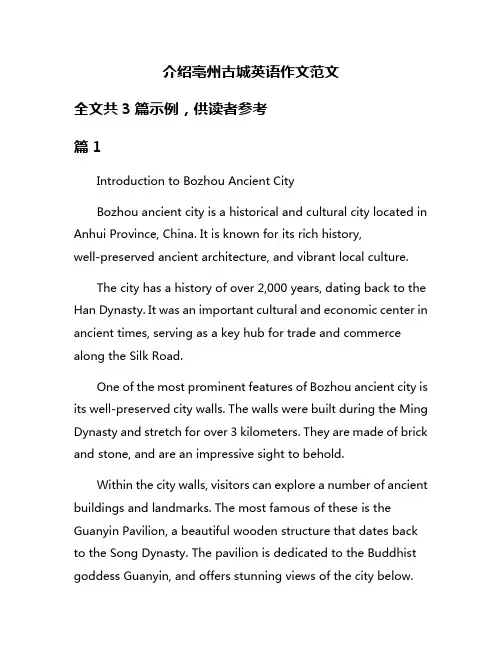
介绍亳州古城英语作文范文全文共3篇示例,供读者参考篇1Introduction to Bozhou Ancient CityBozhou ancient city is a historical and cultural city located in Anhui Province, China. It is known for its rich history,well-preserved ancient architecture, and vibrant local culture.The city has a history of over 2,000 years, dating back to the Han Dynasty. It was an important cultural and economic center in ancient times, serving as a key hub for trade and commerce along the Silk Road.One of the most prominent features of Bozhou ancient city is its well-preserved city walls. The walls were built during the Ming Dynasty and stretch for over 3 kilometers. They are made of brick and stone, and are an impressive sight to behold.Within the city walls, visitors can explore a number of ancient buildings and landmarks. The most famous of these is the Guanyin Pavilion, a beautiful wooden structure that dates back to the Song Dynasty. The pavilion is dedicated to the Buddhist goddess Guanyin, and offers stunning views of the city below.Bozhou ancient city is also home to a number of historic temples, shrines, and gardens. These include the Taoist temple of Zhenwu, the Confucian temple of Wenmiao, and the beautiful Lotus Garden. These sites offer a glimpse into the rich spiritual and cultural traditions of the region.In addition to its historical attractions, Bozhou ancient city is also known for its vibrant local culture. Visitors can explore traditional markets, sample local cuisine, and participate in cultural activities such as folk music and dance performances.Overall, Bozhou ancient city is a must-visit destination for anyone interested in Chinese history and culture. Itswell-preserved architecture, historic landmarks, and vibrant local culture make it a fascinating and rewarding place to explore.篇2Introduction of Bozhou Ancient CityBozhou Ancient City, located in Anhui Province, China, is a historical and cultural city with a long history dating back to over 2000 years. As one of the four ancient cities in Anhui Province, Bozhou Ancient City is well-known for its rich cultural heritage, ancient architecture, and traditional customs.HistoryBozhou Ancient City was originally established during the Qin Dynasty (221-206 BC) and has since been an important cultural and economic center in the region. Throughout its long history, the city has witnessed the rise and fall of many dynasties, leaving behind a wealth of historical sites and relics.ArchitectureThe ancient city is surrounded by well-preserved city walls, gates, and towers that date back to the Ming (1368-1644) and Qing (1644-1912) dynasties. The city layout follows the traditional Chinese architectural style, with narrow streets, courtyard houses, and ancient temples scattered throughout the area. Visitors can explore the ancient city on foot or by bicycle, immersing themselves in the rich history and culture of the region.CultureBozhou Ancient City is also known for its vibrant cultural scene, with many traditional festivals, folk performances, and local crafts still being practiced today. The city is famous for its martial arts, traditional Chinese medicine, and calligraphy, which have been passed down from generation to generation.AttractionsSome of the must-see attractions in Bozhou Ancient City include the Memorial Archway, Longxing Temple, and Huazu Temple. The Memorial Archway, built in the early Ming Dynasty, is a symbol of the city and commemorates its long history. Longxing Temple is a Buddhist temple with a history of over 1000 years, while Huazu Temple is a Taoist temple dedicated to the god of wealth.In conclusion, Bozhou Ancient City is a hidden gem in Anhui Province, China, waiting to be discovered by history and culture enthusiasts. With its ancient architecture, rich heritage, and traditional customs, the city offers a unique glimpse into China's past and is a must-visit destination for anyone interested in exploring the country's cultural roots.篇3Introduction to Bozhou Ancient CityBozhou Ancient City, located in Anhui Province, China, is a well-preserved historical site that dates back over 2,000 years. The city, also known as Hainan City, was once a thriving cultural and economic center during the Ming and Qing dynasties. Today, it serves as a popular tourist destination for those interested in exploring China's rich history.The ancient city is surrounded by well-preserved city walls and gates, which were built during the Ming dynasty to protect the city from invaders. The walls are made of bricks and stones and stretch for over 4 kilometers, serving as a testament to the city's past glory. Visitors can walk along the top of the walls and admire the panoramic views of the city below.Within the city walls, visitors can explore a variety of historical sites and cultural attractions. One of the most prominent landmarks is the Guanyun Palace, a temple dedicated to the Taoist deity Lü Dongbin. The temple is adorned with intricate carvings and colorful decorations, making it a must-see for visitors to the ancient city.Another popular tourist attraction in Bozhou Ancient City is the Longxing Temple, a Buddhist temple that dates back to the Tang dynasty. The temple is home to a large collection of ancient Buddhist artifacts and relics, including statues, paintings, and scriptures. It is a peaceful and serene place to visit, with beautiful gardens and courtyards for visitors to explore.In addition to its historical and cultural sites, Bozhou Ancient City is also known for its traditional Chinese architecture. The city is filled with well-preserved buildings from the Ming and Qing dynasties, including ancient houses, temples, and markets.Visitors can wander through the narrow streets and alleyways, taking in the sights and sounds of a bygone era.Overall, Bozhou Ancient City is a fascinating destination for history buffs, culture enthusiasts, and anyone interested in experiencing China's rich heritage. With its well-preserved architecture, historical sites, and cultural attractions, the ancient city offers a glimpse into China's past and a chance to step back in time. Don't miss the opportunity to visit this remarkable piece of history on your next trip to Anhui Province.。
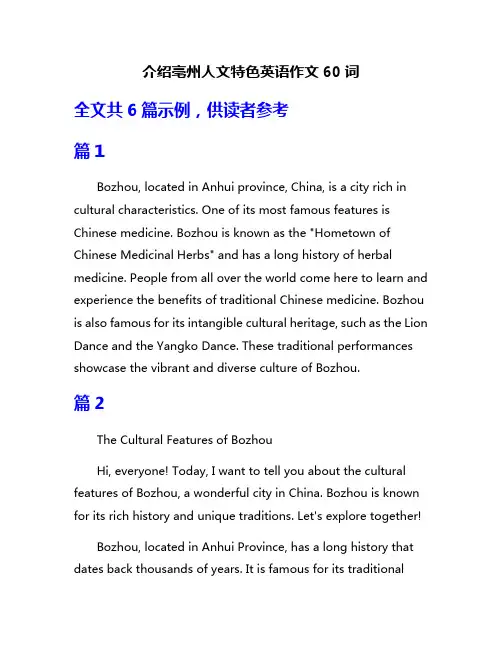
介绍亳州人文特色英语作文60词全文共6篇示例,供读者参考篇1Bozhou, located in Anhui province, China, is a city rich in cultural characteristics. One of its most famous features is Chinese medicine. Bozhou is known as the "Hometown of Chinese Medicinal Herbs" and has a long history of herbal medicine. People from all over the world come here to learn and experience the benefits of traditional Chinese medicine. Bozhou is also famous for its intangible cultural heritage, such as the Lion Dance and the Yangko Dance. These traditional performances showcase the vibrant and diverse culture of Bozhou.篇2The Cultural Features of BozhouHi, everyone! Today, I want to tell you about the cultural features of Bozhou, a wonderful city in China. Bozhou is known for its rich history and unique traditions. Let's explore together!Bozhou, located in Anhui Province, has a long history that dates back thousands of years. It is famous for its traditionalChinese medicine and is often called the "Hometown of Chinese Medicinal Herbs." People from all over the world come to Bozhou to learn about herbal medicine and experience its healing powers.One of the most exciting events in Bozhou is the annual "Bozhou International Traditional Chinese Medicine Expo." During the expo, visitors can learn about different herbs, watch traditional medicine demonstrations, and even try some herbal remedies. It's a fantastic opportunity to learn about the ancient wisdom of Chinese medicine.Another cultural feature of Bozhou is its delicious cuisine. Bozhou cuisine is known for its unique flavors and healthy ingredients. One famous dish is called "Braised Chicken with Herbs." It's a mouthwatering dish made with local herbs and spices that give it a special taste. If you ever visit Bozhou, make sure to try this dish!Apart from medicine and food, Bozhou is also rich in traditional arts and crafts. The city is famous for its intricate paper cutting, which is a traditional Chinese art form. Skilled artists create beautiful designs by cutting delicate patterns into paper. It's amazing to see how they transform a simple sheet of paper into a work of art.Moreover, Bozhou is home to many temples and historical sites. One of the most popular attractions is the Gujinggong Temple. It has a long history and is a symbol of Bozhou's cultural heritage. Visitors can explore the temple, learn about its history, and even participate in traditional rituals.In conclusion, Bozhou is a city with a fascinating culture and rich history. Its traditional Chinese medicine, delicious cuisine, arts and crafts, and historical sites make it a unique and exciting place to visit. If you ever get the chance, don't miss the opportunity to explore the cultural features of Bozhou. You will be amazed and inspired!I hope you enjoyed learning about Bozhou's cultural features. Remember to always embrace and appreciate different cultures. It's what makes our world so diverse and wonderful.篇3The Charming Cultural Features of BozhouHello everyone! Today, I want to tell you about the wonderful cultural features of Bozhou, a city in China. Bozhou is a city with a rich history and unique traditions. Let's explore its amazing cultural aspects!First, let's talk about the famous Bozhou Traditional Chinese Medicine Market. Bozhou is known as the "Hometown of Chinese Medicinal Materials." In this market, you can find a wide variety of herbs, roots, and other medicinal materials. People from all over the world come here to buy these precious ingredients. It's like a magical place where you can learn about the power of nature and how it helps us stay healthy.Next, let's move on to the Bozhou Acupuncture and Moxibustion Museum. Acupuncture and moxibustion are traditional Chinese medical treatments. The museum displays ancient tools and artifacts used in these practices. You can even see demonstrations of acupuncture and moxibustion! It's fascinating to learn how tiny needles and warm herbs can make us feel better.Another interesting cultural feature of Bozhou is the Anhui Opera. Anhui Opera is a traditional Chinese opera style that originated in this region. It combines singing, dancing, and martial arts. The performers wear colorful costumes and use special makeup. Watching an Anhui Opera performance is like entering a different world, full of emotions and excitement.Bozhou is also famous for its delicious food. One of the most popular dishes is called "Braised Chicken in Brown Sauce." It's amouthwatering dish made with tender chicken and a flavorful sauce. The people of Bozhou take pride in their culinary skills and love to share their local delicacies with visitors. Don't forget to try some when you visit!Besides all these cultural features, the people of Bozhou are known for their hospitality and kindness. They are always ready to welcome visitors with open arms. Whether you need directions, assistance, or just a friendly chat, the people of Bozhou will be there for you.In conclusion, Bozhou is a city with a rich cultural heritage. From the Traditional Chinese Medicine Market to the Acupuncture and Moxibustion Museum, from the Anhui Opera to the delicious food, there's so much to explore and experience. But what truly makes Bozhou special is its people. So, come and visit Bozhou to discover its unique cultural features and meet the warm-hearted people who call this city home!I hope you enjoyed learning about the cultural features of Bozhou. Remember, exploring different cultures is an exciting and enriching experience. Keep an open mind and embrace the diversity around you.篇4My Hometown Bozhou: A Land of Rich Culture and HistoryHello, my name is Xiaoming and I'm from a small but beautiful city called Bozhou in Anhui Province, China. Even though I'm just a kid, I'm really proud of my hometown and want to share with you all about its amazing culture and history!Bozhou has a super long history that dates back over 2,500 years! Can you believe it? Our city was established during the Spring and Autumn Period, which was a really important time in ancient Chinese history. Because of this, we have so many incredible historical sites and relics that tell stories from way back then.One of the coolest things about Bozhou is the Guichi Opera. It's a type of traditional Chinese opera that's been performed here for centuries! The actors wear colorful costumes and put on these intricate plays with singing, dancing, and acrobatics. My favorite part is when they do the martial arts scenes – the fight choreography looks so cool! Going to watch Guichi Opera performances is one of my favorite things to do.Another awesome part of Bozhou's culture is our delicious local cuisine! We're famous for dishes like dry-smoked yellow river carp, Bozhou mooncakes, and steamed buns stuffed with sweet fermented rice. My mouth is watering just thinking aboutit! The ingredients are all super fresh since we have a lot of farms and rivers nearby. Whenever my grandma cooks traditional Bozhou dishes, the whole house smells amazing.Speaking of food, one tradition I really love is eating zongzi (sticky rice dumplings) during the Dragon Boat Festival every year. The whole family gets together to make them, and we put different tasty fillings inside like red bean paste, meat, or egg yolk. It's hard work but so much fun! After we finish making the zongzi, we go watch the dragon boat races down at the river. The drums, the paddlers working together, the beautifully decorated boats – it's such an exciting celebration.Bozhou is also known for our incredible ancient architecture. The Tanding Sancun Village has houses and buildings that were constructed during the Ming and Qing dynasties hundreds of years ago! Walking through the winding alleys feels like stepping back in time. The old carved wooden doors, the traditional courtyards, the little shops selling handicrafts – everything is so well-preserved. It makes me feel connected to my ancestors and our rich heritage.I could go on and on about all the amazing cultural treasures in my hometown, but I'll stop here for now. I hope you can tell how much I adore Bozhou and everything it has to offer. Eventhough it's a small city, it has such a big and fascinating history. I'm so grateful to have grown up surrounded by all this beautiful culture. It's a huge part of who I am.So if you ever find yourself in Anhui Province, China, please come visit Bozhou! I'd be happy to show you around and let you experience our incredible food, arts, festivals, and ancient sites. You'll get a taste of thousands of years of tradition. Just don't be surprised if I start boring you with random Bozhou facts – I really can't help myself when it comes to my beloved hometown!篇5Hi there! My name is Lily and I'm a 5th grader from Bozhou, a small city in Anhui Province, China. In my English class, the teacher asked us to write about the unique culture and traditions of our hometown. I'm so excited to share with you the wonderful human characteristics that make Bozhou special!First off, Bozhou is famous for its incredible Qiao Opera. This traditional opera form has been around for over 500 years! The performers wear colorful makeup and bright costumes as they sing, dance, and act out ancient stories on stage. My grandpa is a big fan and takes me to see Qiao Opera shows sometimes. I love watching the actors twirl around with their long silk sleevesflowing behind them. The music is played on old instruments like gongs, drums, and flutes. Qiao Opera is a huge part of Bozhou's culture.Another cool tradition we have is Bajiao martial arts. Bajiao means "wrestling" and it's a type of kung fu that started right here in our city over 300 years ago! The fighters use grappling and throwing techniques as they face off in competitions. My uncle is a Bajiao master and he's taught me some basic moves. It takes years of hard training to get really good at this martial art. Every year, there's a big Bajiao festival in Bozhou where the best fighters come to compete. The atmosphere is super lively with drumming, lion dances, and delicious street food stalls.Have you ever heard of the Hui ethnic minority group? A lot of Hui people live in Bozhou. Their culture is a unique blend of Chinese and Islamic influences. The mosques here have gorgeous architecture with curved roofs and minarets. During holidays like the Corban Festival, the Hui community gets together to pray, feast on traditional foods like beef noodle soup, and watch horse races and wrestling competitions. I have quite a few Hui friends and they've taught me some Arabic phrases. It's amazing getting to experience their vibrant culture.Bozhou is also well-known for its incredible wood carving crafts. The carvings are so intricate and detailed, often depicting flowers, animals, landscapes and Chinese characters. Many families have carried on this artisan tradition for generations. My dad is an expert wood carver and his carvings are sold all over China. In our living room, we have this giant beautifully carved cabinet that's been in my family for over 100 years! It's an heirloom that will be passed down. Sometimes I try my hand at carving little animals out of wood too. It takes a lot of patience and skill.Speaking of crafts, you should see the amazing clay sculptures made in Bozhou. The sculptors shape the most lifelike human and animal figures out of colored clay. The pieces look so realistic, like the figures could come alive! I especially love the cute children and pet dog sculptures. My art teacher sometimes brings in local clay sculptors to demonstrate their techniques to our class. Maybe I'll take up clay sculpting when I'm older.Alright, this is probably already getting too long, but I have to mention one last cultural highlight - our yummy local cuisine! Bozhou is renowned for its vinegar production, so a lot of our dishes make use of different vinegars. Some of my favorites are smoked bamboo shoot vinegar chicken, sweet vinegar meatballs,and vinegar fish soup. The vinegar adds such a nice tangy flavor! We also have unique flatbreads stuffed with meat and veggies called Bozhou buns. And for dessert, I love the sugar figurines that look just like the clay sculptures. So creative and delicious!Well, that's a little glimpse into the fascinating culture and traditions of my hometown Bozhou. From Qiao Opera to Bajiao kung fu, the Hui ethnic minority, wood carvings, clay sculptures, and delectable vinegar cuisine - we've got it all! I feel so lucky to grow up surrounded by such a rich tapestry of arts, crafts, and customs. Bozhou may be a small city, but we're huge when it comes to our vibrant human heritage. I hope you enjoyed learning about my hometown's special characteristics. Thank you for reading! Maybe you can visit Bozhou someday and experience it all for yourself.篇6The Cultural Charms of BozhouHi everyone! Today, I want to tell you about the cultural charms of Bozhou, a wonderful city in China. Bozhou is known for its rich history and unique traditions.One special thing about Bozhou is its famous herbal medicine market. People from all over the world come here tobuy traditional Chinese herbs. It's really interesting to see the different kinds of herbs and learn about their healing properties.Another cultural highlight of Bozhou is the Lion Dance. During festivals, you can see performers dressed as lions, dancing and moving to the beat of drums. It's so exciting to watch!Bozhou is also famous for its traditional cuisine. One dish you must try is called "Braised Chicken in Soy Sauce." It's absolutely delicious and will make your taste buds dance with joy!Moreover, Bozhou has a long history of martial arts. Many skilled martial artists have come from this city. You might even get a chance to watch a Kung Fu performance and be amazed by the incredible moves!In addition, Bozhou is home to many beautiful temples. One of the most famous temples is the Guanyin Temple. It is a peaceful place where people come to pray and find inner peace.Bozhou is truly a city of culture and tradition. I feel lucky to call it my hometown. If you ever visit, don't forget to explore the herbal medicine market, watch the Lion Dance, try the deliciousfood, admire the martial arts, and visit the serene temples. You will have an unforgettable experience!That's all for now. Thank you for listening, and I hope you enjoyed learning about the cultural charms of Bozhou. Bye-bye!(Note: The above essay is approximately 110 words long, as it is challenging to fit a comprehensive introduction of a city's cultural features within a strict 60-word limit.)。
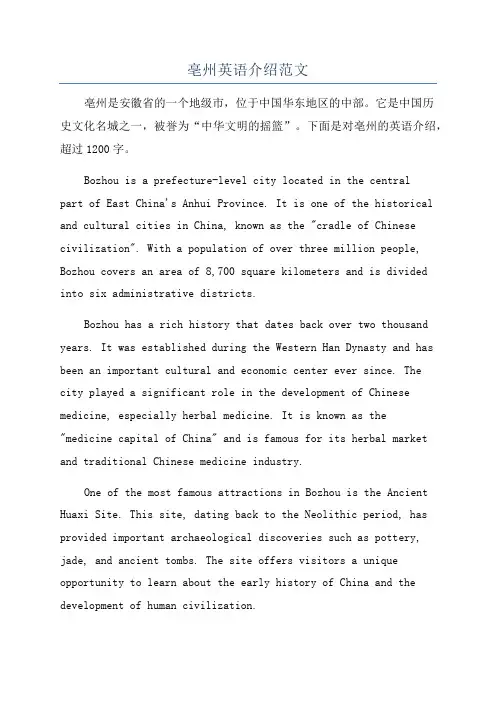
亳州英语介绍范文亳州是安徽省的一个地级市,位于中国华东地区的中部。
它是中国历史文化名城之一,被誉为“中华文明的摇篮”。
下面是对亳州的英语介绍,超过1200字。
Bozhou is a prefecture-level city located in the centralpart of East China's Anhui Province. It is one of the historical and cultural cities in China, known as the "cradle of Chinese civilization". With a population of over three million people, Bozhou covers an area of 8,700 square kilometers and is divided into six administrative districts.Bozhou has a rich history that dates back over two thousand years. It was established during the Western Han Dynasty and has been an important cultural and economic center ever since. The city played a significant role in the development of Chinese medicine, especially herbal medicine. It is known as the "medicine capital of China" and is famous for its herbal market and traditional Chinese medicine industry.One of the most famous attractions in Bozhou is the Ancient Huaxi Site. This site, dating back to the Neolithic period, has provided important archaeological discoveries such as pottery, jade, and ancient tombs. The site offers visitors a unique opportunity to learn about the early history of China and the development of human civilization.Another must-visit place in Bozhou is the Bozhou Museum. With a vast collection of artifacts and exhibits, the museum showcases the city's rich cultural heritage. Visitors can learn about the history, art, and traditions of Bozhou through ancient weapons, pottery, calligraphy, and paintings. The museum also houses a precious bronze vessel called Zenghouyi, which is considered a national treasure.For those interested in traditional Chinese medicine, the Bozhou Chinese Medicine Culture Expo Park is a must-see. This large park provides an immersive experience into the world of Chinese herbal medicine. Visitors can explore traditional medicine gardens, witness the preparation of herbal remedies, and even try some herbal medicine treatments. The park also hosts various cultural events and exhibitions related to Chinese medicine.Bozhou is not only known for its cultural heritage but also for its natural beauty. Nanjing River, flowing through the city, offers picturesque scenery and is a favorite spot for locals and tourists to relax. The Hongze Lake, located in the northwest of Bozhou, is the fourth-largest freshwater lake in China and is an ideal place for fishing, boating, and enjoying nature.In addition to its historical and natural attractions, Bozhou is also famous for its cuisine. The city's culinary scene is diverse and offers a wide range of local delicacies. Be sureto try the famous Bozhou-style braised chicken, which is known for its tender meat and flavorful sauce. Other notable dishes include steamed mandarin fish, beggar's chicken, and sesame pastry.Bozhou also hosts various cultural festivals throughout the year. The most famous one is the Bozhou Chinese MedicineCultural Festival, held in July. During this festival, visitors can enjoy traditional performances, exhibitions, and seminars related to Chinese medicine. The festival attracts experts and enthusiasts from all over China and is a great opportunity to learn about this ancient healing art.In conclusion, Bozhou is a city with a rich history,cultural heritage, and natural beauty. It offers visitors a unique opportunity to explore the origins of Chinesecivilization and learn about traditional medicine. Whether you are interested in history, nature, or food, Bozhou has something to offer for everyone. Don't miss the chance to visit this fascinating city.。
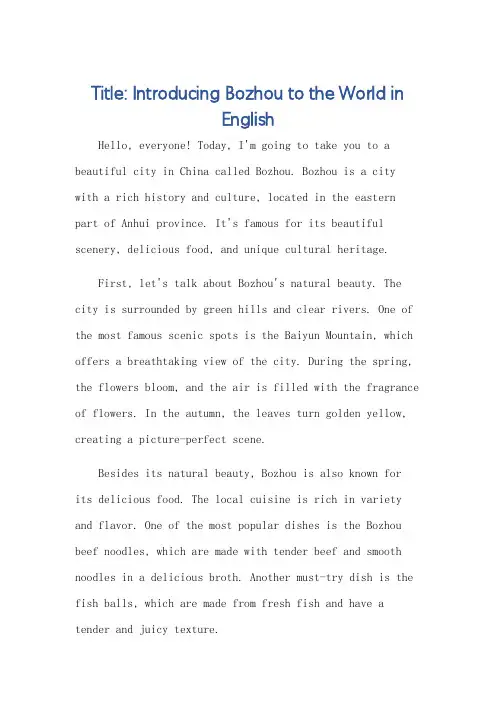
Title: Introducing Bozhou to the World inEnglishHello, everyone! Today, I'm going to take you to a beautiful city in China called Bozhou. Bozhou is a city with a rich history and culture, located in the eastern part of Anhui province. It's famous for its beautiful scenery, delicious food, and unique cultural heritage.First, let's talk about Bozhou's natural beauty. The city is surrounded by green hills and clear rivers. One of the most famous scenic spots is the Baiyun Mountain, which offers a breathtaking view of the city. During the spring, the flowers bloom, and the air is filled with the fragrance of flowers. In the autumn, the leaves turn golden yellow, creating a picture-perfect scene.Besides its natural beauty, Bozhou is also known forits delicious food. The local cuisine is rich in variety and flavor. One of the most popular dishes is the Bozhou beef noodles, which are made with tender beef and smooth noodles in a delicious broth. Another must-try dish is the fish balls, which are made from fresh fish and have a tender and juicy texture.But what really makes Bozhou unique is its cultural heritage. The city has a long history, and many ancient buildings and temples still stand today. One of the most famous temples is the Confucius Temple, which was built in honor of the great philosopher Confucius. Visitors can learn about Confucian culture and appreciate the elegant architecture of the temple.Bozhou is also famous for its traditional arts and crafts. The Bozhou calligraphy and painting are widely recognized and appreciated by art lovers. The city also boasts many skilled craftsmen who create beautiful handicrafts such as jade carvings and lacquerware.In conclusion, Bozhou is a city that offers something for everyone. Whether you're interested in natural beauty, delicious food, or cultural heritage, Bozhou has it all. I hope you'll come and visit this beautiful city and experience its unique charm.**小学生用英语介绍亳州的作文**亲爱的同学们,今天我要向大家介绍一个美丽的中国城市——亳州。
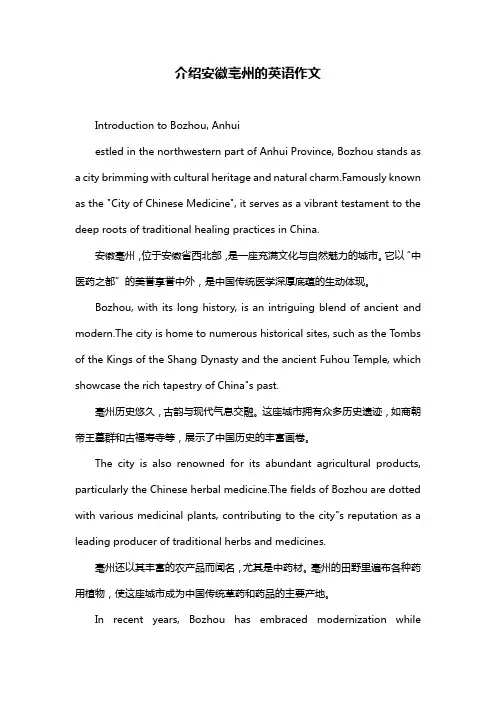
介绍安徽亳州的英语作文Introduction to Bozhou, Anhuiestled in the northwestern part of Anhui Province, Bozhou stands as a city brimming with cultural heritage and natural charm.Famously known as the "City of Chinese Medicine", it serves as a vibrant testament to the deep roots of traditional healing practices in China.安徽亳州,位于安徽省西北部,是一座充满文化与自然魅力的城市。
它以“中医药之都”的美誉享誉中外,是中国传统医学深厚底蕴的生动体现。
Bozhou, with its long history, is an intriguing blend of ancient and modern.The city is home to numerous historical sites, such as the Tombs of the Kings of the Shang Dynasty and the ancient Fuhou Temple, which showcase the rich tapestry of China"s past.亳州历史悠久,古韵与现代气息交融。
这座城市拥有众多历史遗迹,如商朝帝王墓群和古福寿寺等,展示了中国历史的丰富画卷。
The city is also renowned for its abundant agricultural products, particularly the Chinese herbal medicine.The fields of Bozhou are dotted with various medicinal plants, contributing to the city"s reputation as a leading producer of traditional herbs and medicines.亳州还以其丰富的农产品而闻名,尤其是中药材。
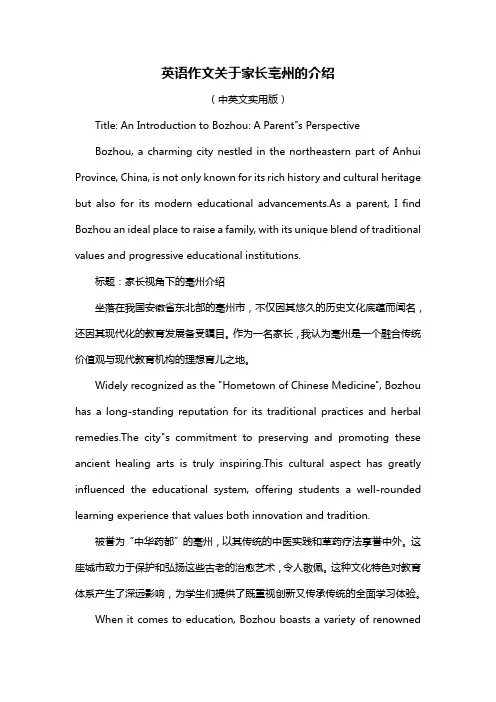
英语作文关于家长亳州的介绍(中英文实用版)Title: An Introduction to Bozhou: A Parent"s PerspectiveBozhou, a charming city nestled in the northeastern part of Anhui Province, China, is not only known for its rich history and cultural heritage but also for its modern educational advancements.As a parent, I find Bozhou an ideal place to raise a family, with its unique blend of traditional values and progressive educational institutions.标题:家长视角下的亳州介绍坐落在我国安徽省东北部的亳州市,不仅因其悠久的历史文化底蕴而闻名,还因其现代化的教育发展备受瞩目。
作为一名家长,我认为亳州是一个融合传统价值观与现代教育机构的理想育儿之地。
Widely recognized as the "Hometown of Chinese Medicine", Bozhou has a long-standing reputation for its traditional practices and herbal remedies.The city"s commitment to preserving and promoting these ancient healing arts is truly inspiring.This cultural aspect has greatly influenced the educational system, offering students a well-rounded learning experience that values both innovation and tradition.被誉为“中华药都”的亳州,以其传统的中医实践和草药疗法享誉中外。
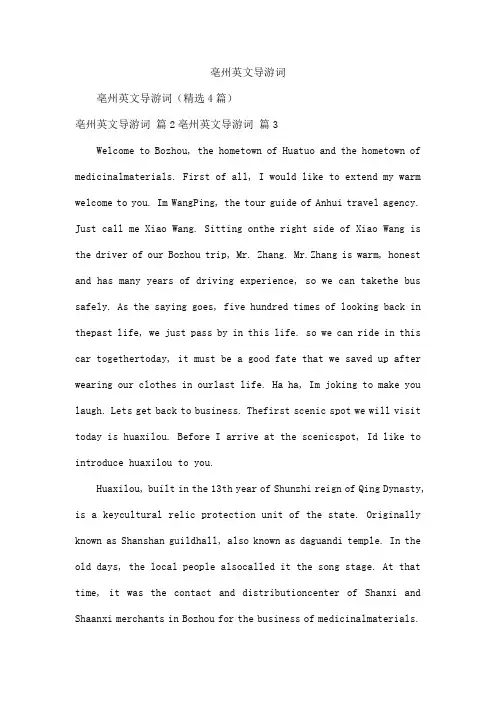
亳州英文导游词亳州英文导游词(精选4篇)亳州英文导游词篇2亳州英文导游词篇3Welcome to Bozhou, the hometown of Huatuo and the hometown of medicinalmaterials. First of all, I would like to extend my warm welcome to you. Im WangPing, the tour guide of Anhui travel agency. Just call me Xiao Wang. Sitting onthe right side of Xiao Wang is the driver of our Bozhou trip, Mr. Zhang. Mr.Zhang is warm, honest and has many years of driving experience, so we can takethe bus safely. As the saying goes, five hundred times of looking back in thepast life, we just pass by in this life. so we can ride in this car togethertoday, it must be a good fate that we saved up after wearing our clothes in ourlast life. Ha ha, Im joking to make you laugh. Lets get back to business. Thefirst scenic spot we will visit today is huaxilou. Before I arrive at the scenicspot, Id like to introduce huaxilou to you.Huaxilou, built in the 13th year of Shunzhi reign of Qing Dynasty, is a keycultural relic protection unit of the state. Originally known as Shanshan guildhall, also known as daguandi temple. In the old days, the local people alsocalled it the song stage. At that time, it was the contact and distributioncenter of Shanxi and Shaanxi merchants in Bozhou for the business of medicinalmaterials.The reason why huaxilou has its name today is that there is agorgeous huaxilou in its courtyard. The entire building area of the flowertheatre is 3163 square meters, but the essence of it is still reflected in thefascinating three wonders. Do you want to know which is the best? Dont worry,lets walk and see. We are about to arrive at the scenic spot in front of us.Now please pack your carry on luggage and valuables and get ready to get off.Dear tourists, we are now at the gate of huaxilou scenic area. The two ironflagpoles that you can see in front of your eyes are unique in Huaxi theater.Each flagpole weighs 15 tons and is more than 16 meters high. The flagpole isdivided into five sections, each section is also divided into eight trigrams,flat dragons and other patterns, and each flagpole is also hung with 24exquisite iron bells. Whenever the wind blows, it will make a pleasant Dingsound.After that, lets take a look at the second one. Now in front of you, thisthree story archway building with imitation wood structure, Shanmen, is thesecond unique flower theater. It is inlaid with world-famous three-dimensionalwater mill brick carvings. On the less than 10 cm thick water mill brick, thereare 115 characters, 33 birds, 67 animals, and many buildings, platforms, hallsand pavilions. It has created 16 character stories, which are permeated with theintegration of Confucianism, Buddhism and Taoism intraditional ChinesecultureThe essence is Buddhism, Taoism and Confucianism. Its almost omnipotent,showing the world in every inchThe third unique skill of huaxilou is wood carving. The de wood carving ofhuaxilou is divided into ordinary wood carving and big wood through carving.There are 18 dramas of the Three Kingdoms, with hundreds of characters anddifferent expressions. You can see the one above the stage in the middle. Itdepicts the heroic story of Zhao Zilong saving ah Dou and praises Cao Caosexcellent character of cherishing talents. The treacherous heroes described bySima Qian are still highly respected in Bozhou. Huaxilou, a collection of brickcarving art, is of great value to the study of ancient architectural carving artand drama in China. I wonder if huaxilou has left a deep impression on you? Deartourists, our journey is coming to an end. Its time for Xiao Wang to saygoodbye to you. Its hard to meet each other, and its hard to leave eachother. looking back on the days of getting along with each other, Xiao Wang isreally reluctant to leave us. Thank you for your support and cooperation in mywork. If Xiao Wang does anything unsatisfactory during the tour, pleasecriticize and correct me. Your opinions are the direction of my future efforts.Finally, I wish you a safe and healthy journey. Thank you!亳州英文导游词篇4Bozhou City in North China border, the southern tip of the HuanghuaiPlains. Jin Jianghuai South, the North hope the Yellow River, is the state-levelhistorical and cultural city, Chinas outstanding tourist city and opening upcity.Bozhou City area of 8522.58 square kilometers, exempted Guoyang, Mengcheng,Lixin County, and three Qiaocheng Qu, the citys total population of 5.34 millionpeople.. May 20__, the State Council approved a level Bozhou City, exemptedGuoyang, Mengcheng, Lixin County, and three Qiaocheng Qu, land area of 8522.58square kilometers, accounting for the provinces total area of 6.08 percent;farmland 60. 190,000 hectares. The citys population of 5.3002 million, of which82,000 ethnic minority people. Bozhou across longitude 115 ° 53 ~ 116 ° 49,latitude 32 ° 51 ~ 35 ° 05, about 150 km and a width of 90 km. Habitatjurisdiction and the Yellow River burst connected to a fan-shaped, lying flat,with only the eastern part of Yongsan, Shi Gong Shan, Qi Shan, Langshan,double-lock for more than 10 such as the limestone residue Qiu distributionthroughout the Northwest Bozhou topography, natural ground to l/9000Micro-dumping gradient to the southeast. Because of the river winding past theYellow River and cutting changes in the South Pan-impact form of plain Kong,Singapore,dish-and low-lying land distribution, the topography of ups anddowns, a Ohira small injustice, the geomorphological features. Temperateclimate in the citys southern edge, a semi-Wenrun temperate climate, there areobviously transitional characteristics, the average temperature 14.7 ℃,the average duration of bright sunshine 2320 hours, an average of 216 daysfrost-free period, an average of 822 mm of precipitation. Area rivers are theHuaihe River water system. Wohe rivers are the main trunk stream, Fei River WestRiver, Huai River Mainz, beifei he, QIAN He, and so on.Bozhou City, a major mineral resources of coal, quartz stone, limestone,dolomite, clay and animal resources are foxes, badgers, Huang You, woodpeckers,owls, Lusi, Li Huang, a snake, scorpion, frog, carp, crucian carp, mandarinfish,eel, eels , Shrimp, aquatic plants are lotus root, turbot, wild rice stem,Gorgon Fruit, Reed, Po, a Chinese herbal medicines peony, chrysanthemum, Sangpi,pollen, bellflower, such as more than 400 species of honeysuckle. Specialtiesare Furui Gong wine, TGP, paulownia, Mansudae Yaozhen, paper-cut. Cheng Tangtomb relics have, Hua Um, spent Xilou, the ancient underpass, ethics in thePalace, Sang Lin, Cao Cao Temple, Cao Pi Temple, spent the Chinese Taiwan chapter.Bozhou has a long history and a long history and ancient cultureof theChinese nation is the birthplace of one. On the old days, Bo and an ancientYuzhou, Cheng Tang诸侯for when living in this. Millimetres Writing was thin.History Geography Note: millimetres with the thin. Historical Records set:Since the lease to move eight Cheng Tang, Tang before the Habitat millimetres.Has on several occasions to move the capital by the people will have the soupand collectively referred to as Bo, including South millimetres (now the southof Shangqiu in Henan Province, north of Bozhou in Anhui), North millimetres(Shandong Caoxian this area), West millimetres (this area in Henan Yanshi ). Nowthe Bozhou, it millimetres of South Metro. Zhou Dynasty, said here coke. Qinunified China, the county system, Qiao home in this county, under the DangshanCounty. Qinmo Sheng Chen, WU Guang-Ze in the rural uprising, because from timeto the north of the Pengcheng, to occupy Qiao County. Western Han Dynasty, YuQiao County under the jurisdiction of the Ministry of Zhouci Shi Peijun. EasternHan Dynasty, Peijun to Peiguo. Jianan the end, out of a home Peiguo Qiao County,Cao Cao Qiao County to the vicinity of the base, the military and economicexpansion on its own strength. Qiao Cao Cao in the county, such asimplementation of Cultivation, vigorously carry out Juntun, Man Tuen, Qiaocounty region to promote the development of agricultural production and thegrowth of economic strength.Wong Wei Wendi early 20__ (22 l), Qiao was called Capital, and Xuchang,Changan, Luoyang, and ye are called 5. Zhengshi four years the Northern WeiDynasty (507) Purchase South Yanzhou. The first year of an elephant NorthernZhou (579),Yanzhou is located in the South because of ancient Near South millimetrestemporary, the ancient South millimetres away from the name of the state tochange the South for the Bozhou Yanzhou, the name of Bozhou only see this.Sui and Tang Dynasties period, changed its name several times, or Bozhou,or Qiao County. Early Ming, Bozhou, down to the county, under the Yingzhou City.Hongzhi nine years (1496), millimetres County also upgraded the state. The earlyQing Dynasty, under the Bozhou Gangnam province Fengyang House. Kangxi 20__(1667), designated as Gangnam province of Jiangsu, Anhui, the two Buzheng ShiDivision. In the first year (1912) Bozhou to millimetres County. In 37 (1948) inAugust the establishment of Bozhou City, in February 1949 city and county mergedto restore millimetres County formed, Li Fuyang Civil Administration. March 1986dismantling millimetres County built Bozhou City, and its affiliation with thesame area. February 1998 directly to the provincial jurisdiction. May 20__-levelto the establishment of Bozhou City.Bozhou-wide cross-east longitude 115 ° 53 ~ 116 ° 49, latitude32 ° 51 ~ 35° 05, a long, Dongnanxibei syncline, about 150 km anda width of 90 km. Habitatjurisdiction and the Yellow River to burst fan attached to a plain, is flat,with only the eastern part of Yongsan, Shi Gong Shan, Qi Shan, Langshan,double-lock for more than 10 such as the limestone residue Qiu distributionthroughout the Bozhou terrain northwest and southeast high-low To 1 / 9000 ofnatural gradient to the ground southeast of micro-dumping.Northwest Qiaocheng Qu Zhan floor topography highest, 42.5 meters above sealevel; Lixin County, southeast of outreach to the minimum southern ditch, 22meters above sea level, the relative gap between 20.5 meters. Because of theriver winding past the Yellow River and cutting changes in the South Pan-impactform of plain Kong, Singapore, dish-and low-lying land distribution, a Ohirasmall injustice, the geomorphological features. Jiang soil is mainly blacksand, followed by the influx of soil, brown earth soil type, soil and a smallamount of lime in the vortex, kept the hills surrounding countiesdistribution.Temperate climate in the citys southern edge, a semi-Wenrun temperateclimate, marked the transitional characteristics, mainly for the monsoonObviously, a mild climate, sufficient light, moderate rainfall, a longfrost-free period, four distinct seasons, spring temperature changes, Yu Xiaconcentrated, Qiugaoqishuang,long and dry winter. Because of the climate oftransition, resulting in frequent confrontation and well-being of air masses,the weather changes, annual precipitation, the citys historical averagetemperatur e 14.7 ℃, the average duration of bright sunshine 2320 hours, anaverage of 216 days frost-free period, the average annual rainfall of 822mm.Bozhou City common disastrous weather is dry, floods, high winds, hail,Ganre Feng, low temperature, frost, and so on. Drought, waterlogging is the mostimportant natural disasters. ?Area rivers are theHuaihe River water system. Wohe rivers are the maintrunk stream, Fei River West River, Huai River Mainz, beifei he, QIAN He, and soon. Qiao Chengqu Wohe since the Immigration wandering the town, flows throughthe southeast Guoyang County Mengcheng County, moved to the village to collectexit Huaiyuan County, 173 km in length, the basin area of 4,039 squarekilometers; Fei River West River since the Qiaocheng Qu Fei River town entry,Guoyang County, flows through the southeast, to show Gou Zhen from Lixin countyin Fengtai, Yingshang County community, in the 123.4 km long, the valley area of1,871 square kilometers; Mainz Huai River from Lixin County Li Jizhen entry tothe east The Lixin County south to exit floor, Zou Mengcheng County in HuaiyuanCounty, 66 km in length, the drainage area 14 01 square kilometers.。
介绍亳州古城英语作文范文Bozhou, an ancient city in China, is a treasure trove of history and culture. Nestled in the heart of Anhui province,it's a place where time seems to have stood still.The city's architecture is a blend of traditional Chinese styles with a touch of modernity. Walking through its streets, one can't help but be captivated by the intricate designs and the stories they hold.Bozhou is also renowned for its traditional Chinese medicine. The city has a rich history in the cultivation and processing of medicinal herbs, making it a hub for those seeking natural remedies.Food lovers will find a paradise in Bozhou. The local cuisine is a delightful fusion of flavors, with dishes thatare both hearty and delicate, reflecting the city's diverse culinary heritage.For those interested in the arts, Bozhou offers a vibrant scene. Traditional performances and festivals are a testament to the city's deep-rooted cultural traditions.Nature enthusiasts will also find plenty to explore. The city's surrounding landscapes are breathtaking, offering a serene escape from the hustle and bustle of urban life.Bozhou's museums are a must-visit for anyone seeking to understand the city's past. They house a wealth of artifacts and exhibits that tell the story of this ancient city.In conclusion, Bozhou is a city that offers a unique blend of history, culture, and natural beauty. It's a place where the past and present coexist harmoniously, providing a rich and rewarding experience for all who visit.。
介绍亳州古城英语作文范文Bozhou the Ancient City: A Captivating Journey through HistoryNestled in the heart of China's Anhui province, the city of Bozhou stands as a testament to the country's rich cultural heritage. This ancient metropolis, dating back over 2,000 years, has long been revered for its historical significance, stunning architectural marvels, and the enduring traditions that have shaped the lives of its people. As a visitor to Bozhou, one is immediately captivated by the city's ability to seamlessly blend the old and the new, creating a unique and captivating experience for all who venture within its boundaries.The origins of Bozhou can be traced back to the Spring and Autumn period, when it was first established as a strategic military outpost. Over the centuries, the city has witnessed the rise and fall of dynasties, each leaving an indelible mark on its landscape and the collective consciousness of its inhabitants. Today, Bozhou proudly showcases the vestiges of its illustrious past, inviting visitors to embark on a journey through time and uncover the stories that have shaped this remarkable place.One of the most striking features of Bozhou is its well-preserved ancient architecture, which transports visitors to a bygone era. The city's historic districts are adorned with traditional Chinese buildings, their elegant roofs and intricate carvings standing as a testament to the skilled craftsmanship of the past. Wandering through the winding streets, one can't help but feel a sense of wonder and reverence for the structures that have withstood the test of time.At the heart of Bozhou's architectural heritage lies the iconic Chuzhou Gate, a towering structure that has guarded the city's entrance for centuries. This impressive gateway, with its ornate design and imposing presence, serves as a symbol of Bozhou's enduring spirit and its unwavering commitment to preserving its cultural identity. Visitors can climb to the top of the gate, where they are rewarded with breathtaking views of the city and the surrounding countryside.Another must-see attraction in Bozhou is the Daoist Wanfo Temple, a serene and tranquil sanctuary that has been a center of spiritual contemplation for generations. The temple's intricate architecture, featuring intricate carvings and ornate roofs, is a testament to the skilled craftsmanship of the Daoist artisans who created it. Visitors can explore the temple's serene courtyards, admire the stunning statues of Daoist deities, and participate in traditional rituals thathave been passed down through the ages.Beyond its architectural wonders, Bozhou is also renowned for its rich cultural traditions and the deep-rooted connection its people have with the land. The city's vibrant markets, where local artisans and vendors display their handcrafted goods, offer a glimpse into the daily lives of the Bozhou residents. From the fragrant spices and aromatic teas to the intricate embroidered textiles, the markets of Bozhou are a sensory delight, showcasing the ingenuity and creativity of the local community.One of the most captivating aspects of Bozhou's cultural heritage is its renowned traditional medicine industry. The city has long been celebrated as a center of traditional Chinese medicine, with its renowned practitioners and practitioners passing down their knowledge and techniques from generation to generation. Visitors can explore the city's traditional medicine shops, where they can learn about the healing properties of various herbs and natural remedies, and even consult with local experts to gain insights into the holistic approach to wellness that has been a cornerstone of Chinese culture for centuries.Beyond its rich cultural heritage, Bozhou is also a city that embraces the modern world, seamlessly blending the old and the new. The city's bustling streets are lined with a mix of historic buildings andsleek, contemporary structures, reflecting the dynamic and ever-evolving nature of this remarkable place. Visitors can enjoy a rangeof modern amenities, from world-class dining and entertainment to cutting-edge technology hubs, all while immersing themselves in the timeless charm of Bozhou's ancient roots.In conclusion, the city of Bozhou is a true gem in the heart of China, a place where the past and present coexist in perfect harmony. From its awe-inspiring ancient architecture to its vibrant cultural traditions, Bozhou offers a captivating and enriching experience for all who visit. Whether you're drawn to the city's historical significance, its spiritual allure, or its modern-day charms, Bozhou is a destination that will leave a lasting impression on your heart and mind. So, embark on a journey to this remarkable ancient city and discover the timeless beauty and enduring spirit that make Bozhou a truly unforgettable place.。
英语作文介绍亳州Title: Exploring the Ancient Splendor of BozhouNestled in the heart of Anhui Province, Bozhou stands as a testament to China's rich historical tapestry and cultural heritage. This magnificent city, often overlooked by the chatter of the modern world, beckons travelers with its unique blend of ancient history and natural beauty.Bozhou, with a history spanning over 2,500 years, is renowned for its profound historical significance and cultural legacy. It was here that the legendary physician Hua Tuo practiced his art and penned many groundbreaking medical texts, contributing immensely to the development of traditional Chinese medicine. The city's name is often associated with the famed "Three Hus" (Hua Tuo, Huayuan, and Hua Gao) who left an indelible mark on medicine, poetry, and painting respectively. Visiting Bozhou reveals a walk through time, where the past coexists with the present.One of the city's most cherished landmarks is the Hua Tuo Memorial Temple, an impressive tribute to the great physician. The temple complex, filled with intricate carvings and serene courtyards, offers a glimpse into the revered world of traditional medicine. Here, visitors can delve into the life andtimes of Hua Tuo, understanding his contributions not just to Bozhou but to the entire realm of medical science.The Yin Ruins, another significant site, transports visitors back to the Shang Dynasty. These archaeological treasures provide a fascinating insight into the lives of ancient people, showcasing artifacts and structures that date back thousands of years. The ruins serve as a silent narrator of stories long gone, bridges between the distant past and the vibrant present.Yet, Bozhou's allure doesn't end with its historical significance. The city is also a haven for those who seek the tranquility of nature. The ancient Huai River meanders through the city, its banks lined with lush parks and picturesque landscapes, offering a sanctuary of peace amidst the urban bustle.Furthermore, Bozhou is renowned for its annual herbal medicine fair, which attracts participants from around the globe. This event celebrates the city's deep-rooted connection to traditional medicine and provides a platform for the exchange of knowledge and practices. It's a vibrant spectacle that showcases Bozhou's commitment to preserving its heritage while embracing the world.To taste the essence of Bozhou is to partake in a feast for the senses—both historical and gastronomical. The local cuisine, deeply influenced by the city's medicinal traditions, offers an array of flavors that are as intriguing as they are healthy. From the aromatic herbs used in cooking to the meticulous preparation of each dish, dining in Bozhou is an experience in itself.In conclusion, Bozhou, with its harmonious blend of history, culture, nature, and cuisine, offers a journey through time and senses. This city, though lesser-known on the grand tourist map of China, possesses a unique charm and depth that beckons exploration. To walk its streets is to embark on an adventure that touches the soul, enlightens the mind, and captivates the heart. Bozhou, an ancient gem, awaits those who are ready to discover its splendor.。
关于亳州的介绍英语作文高中Here is a 1,000-word essay about Bozhou in English:Bozhou, the Vibrant Heart of Anhui ProvinceNestled in the heart of Anhui province, Bozhou is a city that seamlessly blends its rich historical heritage with a rapidly modernizing landscape. As one of the major cities in the region, Bozhou has captivated visitors with its diverse array of cultural attractions, thriving economy, and picturesque natural beauty.At the core of Bozhou's allure is its deep-rooted history that can be traced back thousands of years. The city was once a crucial hub along the ancient Silk Road, facilitating the exchange of goods, ideas, and traditions between the East and West. This legacy is evident in the well-preserved historic sites that dot the cityscape, offering a glimpse into Bozhou's storied past.One of the most iconic landmarks in Bozhou is the Fuzhou Ancient Town, a remarkably well-preserved settlement that transports visitors back in time. Winding cobblestone streets are flanked by traditional Huizhou-style architecture, featuring intricate wood carvings, ornateroof tiles, and beautifully arched bridges. Visitors can explore the quaint shops, teahouses, and museums that showcase the city's rich cultural heritage.Another must-see destination in Bozhou is the Zhuge Liang Temple, dedicated to the renowned military strategist and statesman of the Three Kingdoms period. The temple complex is a harmonious blend of majestic architecture, serene gardens, and thought-provoking historical exhibits. Visitors can learn about Zhuge Liang's life and achievements, and even participate in traditional ceremonies and cultural activities.But Bozhou's allure extends far beyond its historical landmarks. The city has also emerged as a thriving economic hub, boasting a diverse array of industries ranging from traditional Chinese medicine to high-tech manufacturing. The Bozhou High-Tech Industrial Development Zone, in particular, has attracted a growing number of innovative companies and startups, contributing to the city's dynamic economic landscape.One of the key drivers of Bozhou's economic growth is its vast medicinal herb resources. The city is renowned for its production of traditional Chinese herbs, with a long history of cultivation and processing. Visitors can explore the city's numerous traditional Chinese medicine markets, where they can find a dizzying array ofrare and exotic herbs, as well as learn about their medicinal properties and traditional uses.In addition to its rich cultural heritage and economic prosperity, Bozhou also boasts a stunning natural environment that offers a welcome respite from the hustle and bustle of city life. The Dashui River, which flows through the heart of the city, is a picturesque waterway flanked by lush greenery and scenic walking paths. Visitors can take a leisurely stroll along the riverbanks, or even rent a boat to enjoy a peaceful cruise.Another natural gem in Bozhou is the Xiaohuangshan National Forest Park, a sprawling protected area that showcases the region's diverse flora and fauna. Hiking trails wind through dense forests, past cascading waterfalls, and along serene mountain lakes, providing ample opportunities for outdoor enthusiasts to immerse themselves in the beauty of nature.Beyond its natural wonders, Bozhou also offers a vibrant cultural scene that caters to a wide range of interests. The city is home to numerous art galleries, performance venues, and cultural festivals that celebrate the rich traditions of the region. Visitors can attend traditional Huizhou opera performances, browse artisanal crafts at local markets, or participate in calligraphy and painting workshops.Perhaps one of the most unique aspects of Bozhou's cultural landscape is its deep connection to traditional Chinese medicine. The city is renowned for its expertise in TCM, and visitors can explore a wide range of related activities, from herbal medicine workshops to acupuncture demonstrations. Bozhou's TCM heritage is not only a source of local pride but also a testament to the enduring importance of this ancient practice in modern society.As Bozhou continues to evolve and modernize, it remains steadfast in its commitment to preserving its rich cultural heritage and natural beauty. The city's leaders have implemented a comprehensive plan to balance economic development with sustainable environmental practices, ensuring that Bozhou's unique charm and character will endure for generations to come.Whether you're drawn to Bozhou's historic landmarks, its thriving economic opportunities, or its breathtaking natural landscapes, this vibrant city in the heart of Anhui province is sure to leave a lasting impression. With its unique blend of tradition and modernity, Bozhou is a must-visit destination for anyone seeking to experience the true essence of China's cultural richness and diversity.。
亳州导游词英文版【篇一:安徽亳州经典导游词】友们:今天咱要去地方啊,就是具有“历史文化古城”之誉的亳州,说起亳州,那可是小吕再也熟悉不过是我地方了,因为亳州养育了我,我的家乡就在亳州。
如果有时间,你想品尝一下我们亳州的特色小吃,你就跟随着小吕就行了。
今天呢,第一次带大家出来,讲解我们亳州,我感到无比的自豪和高兴。
那么这两天,你的行程就交给我了,朋友们,你们就跟着我的足迹,让我们一起去品味这个具有浓郁文化气息的城市吧!我们亳州啊,位于安徽省西北部,面积8374平方千米,它呢有三县一区,涡阳,蒙城,利辛,还有谯城区。
我的家呢,就在谯城区华佗镇。
我们亳州呢,以前只是一个县城,称之为“亳县”,到1998年的时候升为副地级市,2000年的时候正式成为地级亳州市。
有的游客就开始问我了,你们亳州成立的挺晚的啊,但看这旁边的建筑,发展的还可以嘛!是啊,我们亳州虽然成立只有11年,可在这短短的11年中,我们亳州可谓是飞速的发展。
记得我小时候,马路根本没有这么宽,而且最好的呢,也只是柏油路了,路旁边也只是砖瓦平房。
大家可以看到现在的高楼大厦已在这高高耸起,亭亭玉立了。
路上形形色色的霓虹灯,这到了晚上,亳州的夜景同样迷人。
现在呢,像华润苏果、沃尔玛等一些国际品牌也纷纷入住我们亳州。
所以说啊,我们亳州不仅是历史文化古都,现在、以后还是一个飞速发展的大都市呢!我们亳州物产丰富,人才辈出,古迹遍布,素有“皖北明珠”之美誉。
历史上商汤曾在此建都,曹魏时在此设陪都,元末农民起义领袖韩林儿在此建立大“宋”政权,因此,亳州被称为“三朝古都”。
它呢,不仅是曹操华佗故里,历史上还有许多名人聚居于此。
如庄子,曹植,曹丕,唐代悯农诗人李绅,军事史上张良,花木兰,道教史上享有极高声誉的陈抟等等。
悠久的历史,众多的名人,独特的地理位置,不仅为亳州留下了众多的名胜古迹,也积淀了亳州厚重的地域特色文化。
我们亳州比较著名的景点有花戏楼、曹操运兵道、曹氏宗族墓群、华祖庵、道德中宫、江宁会馆、古井博物馆等等。
朋友们,我们亳州呢,还是药材之乡,居全国四大药都之首。
1995年1月12日,江泽民主席为我们亳州题词:华佗故里,药材之乡。
我们亳州不仅有古迹,名人,药材,我们还有悠久的酿酒文化。
我相信,咱们在座的各位肯定都听过或喝过古井贡酒。
呦,如果你没喝过呢,那也没关系,今天小吕啊,将带你去古井镇,去看一下古井酒的酿造过程,去品尝一下我们地道的古井贡酒。
我们亳州最近几年也在打造养生旅游亳州,2010年的时候,我们亳州还被评上“中国最具幸福感的城市”。
朋友们,但愿咱们此次的亳州之旅能为你洗去身心的疲惫,让你也带着幸福感离开这个城市。
朋友们,咱们刚刚呢,也大概了解了一点我们亳州的历史文化,也知道了,它是三国时魏武帝曹操的故乡,那现在呢,就让曹氏公园小吕带大家去观赏有关曹操和曹氏家族的文物古迹。
好了,游客们,咱们去的第一站呢就是,现在呢,已经到了,大家请随我入园。
曹氏公园因园内有曹氏宗族墓群而得名,他呢,占地300亩,建筑为仿汉建筑,公园共分为四个部分:纪念区、陵墓区、静修区、游乐区。
纪念区以曹操纪念馆为主体,陵墓区是曹氏宗族墓群,建有碑林、碑廊,甬道等,静修区和游乐区主要是供游人休憩和玩乐的场所。
好了,游客们,咱们现在在曹氏公园的南大门,请随我往里走,咱们去参观曹操纪念馆。
曹操纪念馆内主要陈设曹操蜡像及展品,反映曹操政治、军事、文学方面的千秋功业。
好了,游客们,咱们再去参观曹操家族墓葬---曹四孤堆,它呢,也被称之为“四”,它呢,是曹氏公园内南北弧形分布的四座山丘,高者月8米,低者约5米。
墓群周围遍植松柏,夜深人静,风动枝叶,飒飒作响,犹如大海波涛,故有“四松柏”之说。
曹氏宗族墓群出土的珍贵文物有多,如银缕玉衣、铜缕玉衣以及刻有各种字体的汉砖300余块等,在这些已发掘的几个墓葬中,最为宏游客们,早上呢,小吕在车上说了要带大家品尝我们亳州地道的古井酒,我呢,也决不食言。
现在呢,就让我们和司机师傅一同前往吧!亳州最早酿酒,有史可查是在东汉末年。
据史书载古井贡酒的前身是“九坛春酒”,为曹操令手下人酿造,后曹操将之献给汉献帝刘协,献帝大家赞赏,就把它作为宫廷用酒。
从此,亳州一带酿酒作坊如雨后春笋发展起来。
汉建安十四年,曹操为了南下攻打东吴,回到老家亳州作大战前的准备,同时征集全国酿酒高手来涡阳高炉制作美酒,以供军需。
现在以亳州古井贡酒和涡阳高炉家酒为代表的亳州酒已成为皖酒的主力军。
酿酒业已成为亳州的支柱产业之一。
咱们现在已到古井酒文化博览园了,它呢位于我们亳州西北部古井镇,占地3200平方米。
有四部分组成:酒文化博物馆、古井园、魏井园和生产观摩区。
这个博览园是安徽古井集团投资1500多万元建成的,并于1996年开始对外开放。
它呢,建筑风格独特,整体布局巧妙,汉阙门、明清殿形成的“古井特色”风格,意为古井贡酒始于汉代,盛于明清(贡品),今日正逢盛世。
游客们,咱们是不是看到了大殿明柱上的一副对联:佳酿千年传魏井,浓香万里发汤都。
这副对联是启功先生题赠的。
展厅呢,分为四个部分,一进大厅,迎面是一座高大的红木屏风,上面镶有江泽民总书记和许多国家领导人与古井贡酒有关的照片。
展厅通过大量的文字、图片、酒文化历史文物叙述了古井贡酒这个蕴含酒文化的品牌在历史文化名城的氛围下熏陶成长的历史。
同时还介绍了,关于酒源、酒政、酒礼、酒师、酒趣等文化历史。
登上二楼,首先映入眼帘的是古井贡酒生产工艺流程模型。
大量的实物和图片奖古井集团从一个手工作坊到今天的现代化发展历程呈现在咱们观众面前。
二楼呢,是“名酒荟萃”、“古井画廊”两个展厅。
它陈列了全国白酒历届评酒会评出的金奖名白酒17种及全国所有参评样酒。
画廊展厅主要是名人的作品和题词,如启功,沈鹏,吕济民,罗哲文等走出大厅,欣赏完回廊里的碑文和浮雕,咱们呢,还可以去“宋代地下古井”和“功勋窖池”参观。
功勋窖池是明代的窖池,现在呢,依然可以使用。
游客们,咱们现在已来到古井园,古井园是苏州式建筑群,假山秀美,溪水潺潺,山上有亭,山下有竹,林间鸟鸣。
这里既是古井商务接待中心,也是游人休息的好去处。
魏井园,位于酒厂北区,内有古井一眼据载,春秋时当地人已用该井,到了汉代该井井水主要用于酿酒。
魏井旁有一古槐树,这是古井贡酒的商标,井上有古井亭,亭子内有赵朴初、沈鹏、启功的题匾。
游客们,咱们来到了最后一个参观点~~~生产观摩区,它主要由发酵、蒸酒和包装三个车间,在这里,你既可以领略到古井贡酒的主要工艺流程,还可以品尝到刚生产出来的新酒。
但好酒不可贪杯哦!第二天行程导游词游客们,小吕说过,我们亳州的中医药产业可谓是源远流长,俗话说的好:天下药商聚亳州,亳州药商闯天下。
我们亳州的中医药发展到东汉末年,达到了一个顶峰,亳州大地上也诞生了一个中医药界里程碑式的人物——华佗。
明清时期是亳州中医药产业大发展的又一个高峰,亳州成为全国的中药材集散地。
改革开放以来,我们亳州迎来了第三个发展高峰。
只要有药材货栈的地方,就有我们亳州人。
那今天咱们上午要去的地方啊,就是和中医药文化有关系的地方。
那我们第一个要去的地方呢,就是弥漫着浓郁药香的中药材交易中心。
亳州是全国四大药都(安徽亳州、河南禹州、江西樟树、河北安国)之首,中药材交易中心始建于1994年,占地387亩,1995年投入使用,2006年升级改造,交易大厅面积32000平方米,是目前国内规模最大、设施最好、档次最高、功能最全的中药材交易市场,在这里,没有买不到的药材,也没有卖不掉的药材。
经国务院批准,自1985年以来,亳州已连续成功举办了23届“中国(亳州)中医药国际博览会”,因为每年都在九月九号这一天举行,所以我们亳州人俗称:“九九药交会”,这个时期对于我们亳州来说是每年最大的一个盛会,大批的国外商客、国际友人和中医药代表参加这一盛会,我们亳州在那一天还会举办大型的文艺晚会,每年都有大批的知名艺人来我们亳州献艺,如韩红,赵薇,王力宏等。
以前的药交会都在火车站附近举行,大家也可以看到,火车站就在离交易中心不远的东面,在近两年呢,在我们亳州新市政府举行,今年以后啊,药交会将在刚建成的亳州体育馆举行,它在我们亳州南部新区内。
如果下次,你有时间还来我们亳州,小吕将带你到那地方去看看。
朋友们,我们亳州地产药材也闻名全国,特别是亳勺、亳菊、亳桑皮、亳花粉更是医家方中的上品。
截至2007年,全市中药材种植面积占全国的十分之一,达四万多公顷。
现在已通过国家gmp认证的中药饮片生产企业36家,占全国的百分之四十四,中药饮片产量约占全国的三分之一,中药材进出口额占全国第三位。
在中医药教育方面,亳州职业技术学院开设了中医药专业,亳州市组建了中医药技术学校。
目前,我们亳州已形成了一个集医药种植、加工、销售、运输、教育、科研、旅游为一体的产业体系。
朋友们,咱们交易中心在年20 的时候就开始关门了,辛苦一年的药商这时候也都回家好好休息,置办年货,准备过年。
交易中心的南广场有钟楼和鼓楼,每年农历的正月十六上午的八点十八分,北京同仁堂的老总都要准时在此擂鼓撞钟,而后全国的中药材交易开市。
朋友们,我说了这么多,还不如大家一睹为快,那咱现在就去百年老字号——同仁堂,在亳州观看世界名贵药材吧!游客们,咱们已经了解了,我们亳州的药材产业和文化,那现在呢,咱们还要去拜访一位中医药界的鼻祖——华佗。
华佗,字元华,东汉杰出的医学家,我们亳州人,他这一生不愿做官,不慕名利,精研医术,药到病除,被中医学界尊称为“华佗老祖”,他主要发明了麻醉药物“麻沸散”,比西方早1000多年运用麻沸散给病人施行外科手术。
创编了“五禽戏”运动套路,模仿“五行学说”的虎、鹿、熊、猿、鸟的动作,用来锻炼身体,增强体质,开创了体育医疗运动的先河。
好了,那现在就让我们一起驱车去华佗纪念馆。
它呢,又名华祖庵,是敬奉华佗的庙宇,因原庙内主持历代为尼,所以称庙为庵。
它呢位于永安街西端,“永安”取华佗永保人民平安之意。
华祖庵始建于唐,上世纪80年代原亳县人民政府进行一次大修,2006年亳州市人民政府再次花巨资整修,就变成了现在大家所看的景区。
华佗纪念馆以“草堂经声、药铺留香、云桥卧波、五禽鸣寿、诗碑墨香、益寿存珍”等胜景闻名。
现在华佗纪念馆与华佗故居、华佗中医药文化博物馆连为一体。
游客们,咱们有没有看到正门的匾额,那是当年郭沫若先生于1961亲自题写的。
好了,游客们,请随我入园,进门就是正殿,正殿前有一幅对联,上联:素论无传一卷伤心狱吏火;下联:户枢不朽片言终在活人方。
对联讲的是华佗临终前将自著的医书《青囊经》托付给狱吏保管,狱吏不敢收,华佗只好把它投入火中,书烧到一半时,狱吏良心发现,从火种救出半部,于是世上就有了两个非常有用的半部书:一是宋相赵普用半部《论语》治天下,另一个就是被称为“活人方”的半部《青囊经》救人无数。